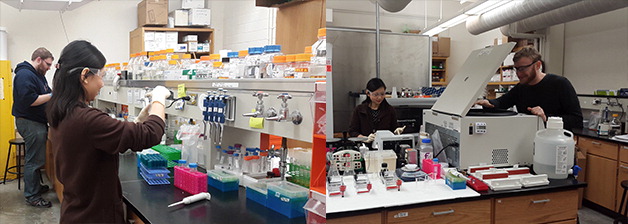Cycle 3 (2014 Deadline) Sustainable conversion of oil palm lignocellulosic waste into pentanol using metabolically engineered microbes
PI: Fransiskus Ivan (
fransiskus.ivan@surya.ac.id), Surya University, with former PI and current co-PI Yalun Arifin
U.S. Partner: Brian Pfleger, University of Wisconsin, Madison
Project Dates: January 2015 to February 2017
Indonesia has the largest oil palm plantations in the world, and together with Malaysia, it accounts for roughly 85% of the world’s palm oil production. However, serious environmental problems are caused by the oil palm plantations and industry. With only 10% of the oil palm plant producing the oil, as much as 90% of the total plant mass becomes lignocellulosic waste, and the disposal of such abundant lignocellulosic waste is problematic. Conversion of oil palm lignocellulosic biomass into valuable chemicals, however, can solve environmental problems related to their disposal while at the same time generating profit. The goal of this research project is to convert oil palm lignocellulosic waste into liquid fuels or high-value chemicals.
To achieve this goal, the research team aims to metabolically engineer microbes using synthetic biology tools to efficiently convert levulinic acid into pentanol. A bacterial strain would be developed that can convert levulinic acid into pentanol in industrially relevant titer, rate (productivity), and yield using metabolic engineering and synthetic biology. As such, this strain can be used to convert oil palm plantation waste into pentanol in a potentially sustainable manner. With the conversion of oil palm lignocellulosic waste into pentanol, such a strain can potentially: (1) reduce environmental problems stemming from the waste disposal issue and (2) produce bio-gasoline (pentanol) in an economical and sustainable manner, potentially significantly reducing consumers’ dependence on petroleum. In the future, if the strain-mediated production of pentanol mathematically proves to be profitable, this could potentially affect the oil palm industry’s intent to expand their plantations through tropical forest destruction, thus protecting wildlife and biodiversity. Also, as principally all lignocellulosic materials can be converted into levulinic acid, this strain should be applicable for other agricultural or forest residue valorization. This may inform policy makers to create and pose new regulations on how to treat such residues. In the long term, the strain can potentially prevent further destruction of tropical forests and wildlife, not to mention the decreased levels of water, pesticides, and herbicides that would otherwise be needed for oil palm plantation maintenance.
Final Summary of Project Activities
The major component of this project, which was completed at the end of March 2017, was a visit of almost two years by Surya University researcher Wasti Nurani to the laboratory of U.S. partner Dr. Brian Pfleger at the University of Wisconsin. Initially Wasti’s work focused on trying to engineer the bacterium Pseudomonas putida so that it can consume a particular lignocellulose-waste derived chemical named gamma-valerolactone (GVL) and later convert it into other chemicals of interest. She attempted to express several potential GVL-breaking enzymes from other organisms in P. putida with the hope that one of them would allow P. putida to grow solely on GVL to an appreciable extent. Not all questions pertaining to the use of GVL by the engineered organism could be answered, perhaps because the gene expression tools being used, which were developed for work with E. coli, did not work as well with P. putida. Therefore, in the second year of Wasti’s visit, she and her colleagues turned their attention to constructing a series of synthetic gene expression tools specifically tailored for P. putida, testing some constitutive and inducible gene promoters. Some of challenges have been resolved, but questions still remain for further study. The initial findings were publicized at the 2016 annual meeting of the Society for Industrial Microbiology and Biotechnology in New Orleans, and two other manuscripts were in preparation as of April 2017. Meanwhile, the team published two other papers in journals during 2016 and team members delivered several technical presentations.

Wasti Nurani at work in Prof. Pfleger's lab (Photo courtesy of Dr. Arifin). |
Despite the research challenges, the PI Dr. Ivan reports several benefits in terms of capacity building for the institutions and individuals involved. This project has contributed to the development of a start-up research group in biotechnology, with research projects on algal bioprocessing and biorefinery technology. Wasti Nurani has received a scholarship to pursue her PhD at the Technical University of Denmark, where she will study yeast metabolic engineering. Laurancia Vina Steifa, a more junior student who spent 10 weeks in Wisconsin working in Dr. Pfleger’s lab in the summer of 2015, is now taking courses toward her Master’s degree in biotechnology at the University of Queensland, Australia. The original PI on the project, Dr. Yalun Arifin, was appointed as chair of the Department of Food Business Technology at Prasetiya Mulya University in Indonesia, having returned from a year and a half on the faculty at Curtin University in Malaysia. Dr. Ivan at Surya University is working closely with the bioinformatics group at Nanyang Technological University in Singapore on a systems biology project, and besides his research he is also active in promoting STEM education focusing on biotechnology to young scholars in Indonesia.
Thanks to the commitment of Dr. Ivan, Dr. Arifin, and their team members, this project had an unexpectedly large outreach component. They delivered several seminars, a two-day
STEM workshop, and a presentation to the public aimed at improving awareness of the importance of biotechnology. They are also preparing a book about 21st century biotechnology that is intended for general readers. It is expected to be published by the end of 2017.
Back to PEER Science Cycle 3 Grants




